Docimo
 From EduTechWiki - Reading time: 3 min
From EduTechWiki - Reading time: 3 min
Introduction[edit | edit source]
"DOCIMO" is an online platform to create online and offline assessments, i.e. an assessment management system (AMS). It was developed by Assess Group, a spin off from a Liège university centre specialized in evaluation engineering. The system has been developed and tested with several partners from industry and educational institutions.
The system can be used in English settings.
See also:
Creating tests[edit | edit source]
Gilles distinguishes four evaluation levels according to Kirkpatrick (1959): (1) Satisfaction, (2) Learning, (3) Behavioral change and (4) Institutional change. Docimo targets level 2 and 3.
Design method[edit | edit source]
Gilles (2002,2010) create a model for creating standardized assessments, called Construction Cycle and Quality Controls for Standardized Testing (CCQCST). According to Gilles (2017), “The CCQCST model includes 8 steps: (1) Analysis of the objectives to be evaluated; (2) Design / test plan; (3) Questions / items elaboration; (4) Training / Information of the trainees to be evaluated; (5) Testing / assessment; (6) correction and analysis of results; (7) feedbacks and (8) cycle regulation for continuous improvement of subsequent evaluations. The CCQCST cycle, as shown above, provides quality control procedures to ensure quality assessments.”
The methods is based on Deming's quality wheel: Plan (prepare an action), do (implement), check (if objectives are met), act (sustainable, corrective)
Majors steps using the software:
- Identify Points to evaluate (PE), i.e. a list of learning objectives to test.
- Define categories of performance (CP) for each PE
- Create a table of specifications (TDS), i.e. a matrix PE x CP with a cognitive level for each CP (e.g. recall, understand, apply, analyse, evaluate, create)
- Define Modality of Questioning (MQ) for each CP, i.e. a matrix PE x CP x MQ
Validity and reliability concerns[edit | edit source]
- Construct validity: A testing score allows measuring learning gains for a given cognitive ability, using an accepted theoretical construct, e.g. Krathwohl's taxonomy
- Content validity: Allows measuring contents taught in the class.
- Reliability: Coherence of response items with overall testing score. See also: inter-judge and intra-judge agreement.
- Sensibility: Measures should be precise but take into account certitudes (confidence level) of the learner
- Communicability: Learners should understand the principle behind the evaluation, e.g. understand what cognitive level(s) will be measured (e.g. recall, understand, analyse, evaluate)
To calibrate questions and response items, Docimo allows computing various coefficients, e.g. biserial correlation coefficient (R bis) and CMoy coefficients between correct answers for a question and correct answers total.
Confidence level[edit | edit source]
In order to prevent random answers, users must enter confidence degrees. According to the selected degree, positive and negative points change.
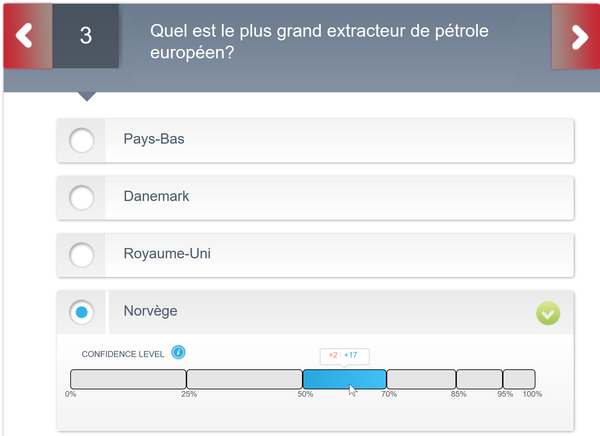
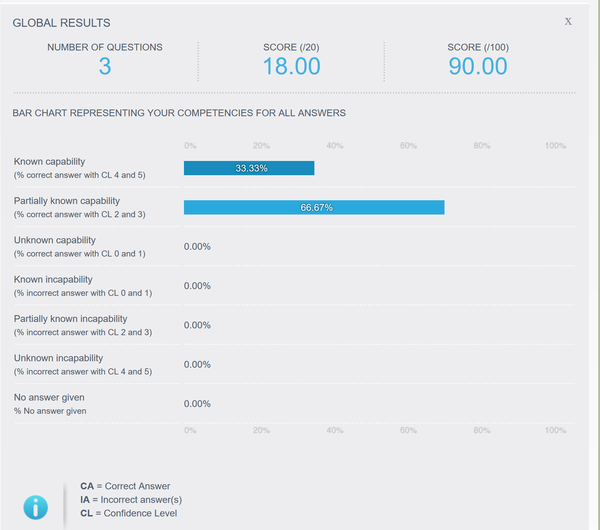
Authoring[edit | edit source]
A few screenshots illustrate some of the functionality.
The authoring interface requires that tests are built in a more or less hierarchical manner
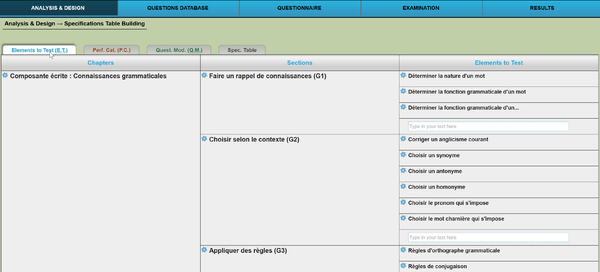

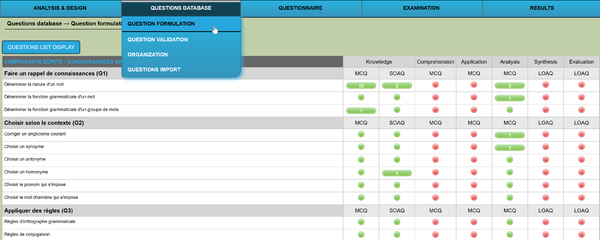
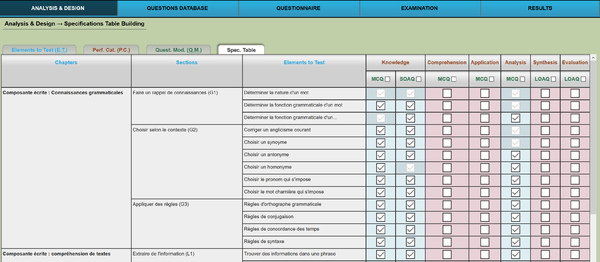
Links[edit | edit source]
- http://www.assess-group.be (old domain)
- https://itinera-group.com/docimo/ (main site)
- The GIRIEF is integrated by a group of researchers, teachers, technologists in areas related to education, psychology, computer science with experts in statistical test analysis, and teaching and learning models.
Additional resources (In french):
Bibliography[edit | edit source]
Dunberry, A., & Péchard, C. (2007). L’évaluation de la formation dans l’entreprise: état de la question et perspectives. UQAM/CIRDEP. https://www.cirdef.uqam.ca/wp-content/uploads/2015/03/CIRDEF-PSRA-Dunberry_EvaluationEntrepriseLitt2007.pdf
Gilles, J.-L., & Tinnirello, S. (2017). DOCIMO: an Online Platform Dedicated to the Construction and Quality Management of Learning and Impact Assessments in the Digital Age. Poster presented at the The #dariahTeach Open Resources Conference Lausanne, Suisse. Retrieved from http://hdl.handle.net/20.500.12162/107
Gilles, J.-L., Henzi, P., et Tinnirello, S. (2018). Instrumentation du cycle de construction et de gestion qualité des évaluations standardisées : apports de la plateforme en ligne DOCIMO. Dans M. Milmeister et C. Weis (Eds.), Colloque 2018 de l'ADMEE-Europe : L’évaluation en éducation et en formation face aux transformations des sociétés contemporaines - Livret des résumés (pp. 29-30). Esch-sur-Alzette, Luxembourg: Université du Luxembourg. http://hdl.handle.net/20.500.12162/106
Gilles, J.-L. (2010). Qualité spectrale des tests standardisés universitaires. Sarrebruck, Allemagne: Editions universitaires européennes. http://hdl.handle.net/20.500.12162/238
Jean‐Luc Gilles, Pascal Detroz & Jean‐Guy Blais (2011) An international online survey of the practices and perceptions of higher education professors with respect to the assessment of learning in the classroom, Assessment & Evaluation in Higher Education, 36:6, 719-733, DOI: 10.1080/02602938.2010.484880 https://srhe.tandfonline.com/doi/abs/10.1080/02602938.2010.484880#.XN06CaTgpnQ
Gilles, J.-L., et Lovinfosse, V. (2004). Utilisation du cycle SMART de gestion qualité des évaluations standardisées dans le contexte d’une Haute Ecole : regard critique en termes de validité, fidélité, sensibilité des mesures, diagnosticité, praticabilité, équité, communicabilité et authenticité. Dans S. Arzola Medina (Ed.), Proceedings of World Education for Educational Research (WAER). Santiago, Chile: Pontifica Universidad Catolica de Chile. http://hdl.handle.net/20.500.12162/890
Kirkpatrick, D.L. (1994). Evaluating training programs: the four levels, Berrett-Koehler, San Francisco (1994)
 KSF
KSF